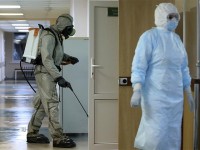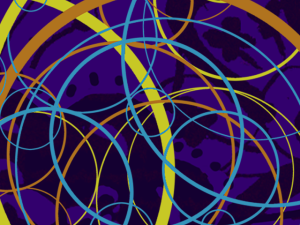He said Belarus would likely face economic tightening not only as a result of the coronavirus pandemic but also a Russian trade oil crisis that worsened this past winter.
Uladzimir Matskevich: nationalism grows in Europe due to the weakness of the Brussels policy

Europeans has realized the threat posed by the Russian propaganda machine, but Russia freely continues its information war so far.
In Moldova and Bulgaria pro-Russian presidents came to power almost at the same moment of time.
Meanwhile ultra-radical forces and groups are emerging in Europe. According to the The Independent estimates radicals may win in seven European countries already in the elections of 2017.
What results may it bring?
Uladzimir Matskevich, philosopher and methodologist, elaborated on the questions of EuroBelarus Information Service.
— In Moldova and Bulgaria pro-Russian presidents came to power. How come the “Russian World” is expanding?
— Indeed, almost simultaneously Moldova and Bulgaria held presidential elections and in both countries people with pro-Russian program come to power, or at least with pro-Russian highlights in the propaganda. But the situation in Moldova and Bulgaria is very different, so one needs to be critical of such a simple interpretation of facts.
Firstly sovereignty is not of high value in Moldova unlike Bulgaria; Bulgaria has been an independent country for a long time, it has strong enough traditions of statehood. Similarly, as the Bulgarian historical tendency to be tossed to and fro. Bulgaria is one of the poorest countries in Europe, and obviously Euroskeptic mood is dominating the country.
Euroscepticism in the European Union takes different forms every time: left-wing bias in Greece, Brexit in the UK. Under the circumstances, Bulgaria voted in favor of the pro-Russian candidate, while having no intention to break the relations with the European Union: it will try to mitigate the European attitude towards Russia through its institutions in Brussels.
We can see a completely different situation in Moldova, which is a dual — either to merge with Romania, or to return to the restoring Soviet Union.
Pro-Russian sentiment of the dominating Russian-speaking population has weakened due to the separation of the country into Moldova and Transnistria.
On the other hand, in the independent Republic of Moldova has never been a dictatorship, so the democracies of Moldova, even those led by the Communists, have never turned into dictatorial regimes and allowed Moldova to quickly adapt to European standards and norms of political life. Therefore, Moldova was considered as one of the most qualified candidates for integration with the European Union.
It is possible that Moldova drifted towards the EU ahead of the public mood. So today two trends are amplified in the country. On the one hand, active citizens of Moldova are trying to get Romanian citizenship and immigrate to Europe, thereby reducing the percentage of pro-European voters. On the other hand, it must be noted that the Moldovan orientation towards Europe is not accidental and temporary but a long-term trend. Therefore, even Dodon after winning the presidential office slightly changed his rhetoric.
One must not believe the Russian propaganda and be euphoric about the victor of the “pro-Russian forces”, and one must not surrender to despair over the fact that these politicians have now come to power.
— The Independent estimates that far-right radicals may win in seven European countries already in the elections of 2017. Why the outcasts yesterday they can become European leaders today?
— On the one hand, growth of nationalism in Europe is caused by the weakness of the Brussels policy. The current policy has lost its appeal to the majority of Europeans. Therefore nationalism has been gaining support for a long time. It drew attention of Russia and the Russian propaganda machine, as Putin set the mission of the restoration of the imperial status of Russia and of restoring the bipolar world and this mission cannot be made possible when acting only inside Russia. Therefore, Putin's regime began to establish realtions with right-wing nationalist movements and political forces around the world.
Moreover, Putin's regime unleashed information war against Europe through the Russian-language media, and then moving on to the broadcast in European languages, mainly English. The Putin’s regime is demoralizing public opinion in Europe.
Even in my first drafts on the third generation of political technologies I warned of the impending danger, and then quite straightforwardly pointed out the threats when writing about information wars with the background of the Russia-Ukraine events. Even at that time I considered it dangerous that Europe ignores the emerging trends.
Finally, Europeans have understood the threat posed by Russian propaganda machine, which strengthens the right-wing forces in those countries, which are “weak link” of European policy. Countries become “weak link” not only due to the economic situation, as it happened with Greece and Ireland. We see the same pattern in prosperous Britain in relation to the newest tendencies: ill-considered migration policy and a wave of migration, which is largely caused by the terrorist attacks in the Middle East and Africa, and not without the participation of the said Russia. Nowadays Europe confronts numerous problems and a part of the politicians and the electorate wants to solve these problems not through the Brussels bureaucracy and the united Europe, but in a selfish way, for their own country only, without coordinating strategies with the European Union partners and, perhaps, even at their expense.
— Can we say that we witness the emergence of a new European fascism? Or is it too strong a word?
— I think this is a great exaggeration. In fact nothing new has occured: the majority of parties and factions gaining popularity have existed for a long while. But, at the same time, it is an alarming bell for Europe, warning that it is needed to contemplate the long-term strategies in advance, rather than go with the flow.
I do not think that Europe has already lost this battle. Yes, the danger is obvious, but it seems to me that there are internal forces that Europe can call for to fight against this danger.
Others
-
From farewell to a new Eastern policy and towards a new development
Poland and Germany were both initiators and drivers of a New Eastern policy linked to the Eastern neighborhood and Russia/Soviet Union.
-
Uladzimir Matskevich: The sooner the "Union State" is denounced, the better for Belarus
Not only does the “Union State” undermine the establishment of civilized relations with Europe, but it hinders the possibility of normal relations between Belarus and Russia.
-
Uladzimir Matskevich: The regime can no longer control the situation in the country
The authorities are unable to prolong the social contract with the people: there is no way out of the social crisis.
-
Press release of the BNP in connection with the next round of the dialogue in the format of the EU-Belarus Coordination Group
Belarusan National Platform of the Eastern Partnership Civil Society Forum welcomes the dialogue process in the format of the EU-Belarus Coordination Group, the third round of which was held in Minsk on 3-4 April 2017.








Comments
Andrei Yahorau — Al Jazeera: “Lukashenko is irresponsible”
He said Belarus would likely face economic tightening not only as a result of the coronavirus pandemic but also a Russian trade oil crisis that worsened this past winter.